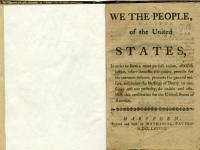This activity highlights several of the constitutional challenges raised by the outbreak of the war in 1861, notably over the powers and responsibilities of each branch of government. President Abraham Lincoln, often working with Congress, revoked the writ of habeas corpus eight times during his presidency. While some of Lincoln’s political opponents conceded the rationale for the revocation of habeas corpus, many thought it unconstitutional for the president to take such an action without the consent of Congress. Other opponents, conversely, viewed any revocation of habeas corpus as a direct assault on the legal protections provided by the Constitution and saw Lincoln’s action as despotic and illegal.
Philadelphia was a center of much of the debate over some of Lincoln’s controversial actions during the Civil War. Both the legal and constitutional issues raised by these decisions received considerable attention from Philadelphia’s legal community. The fact that many of these lawyers were powerful Democrats and political opponents of the president led many to be quite critical of Lincoln’s actions.

